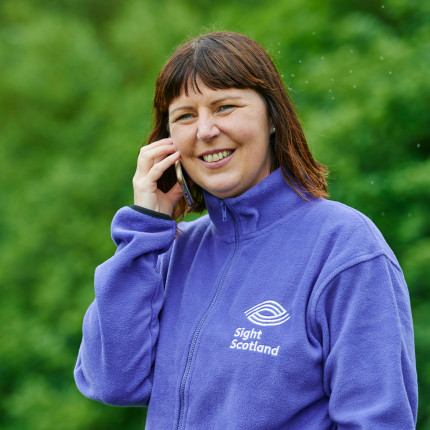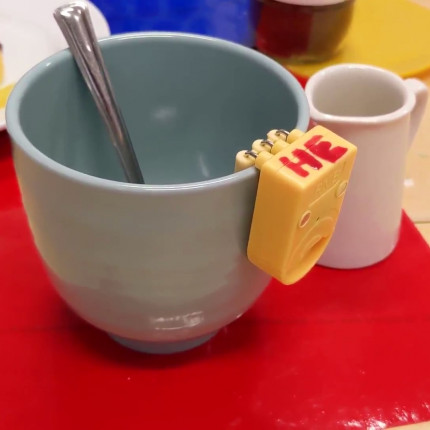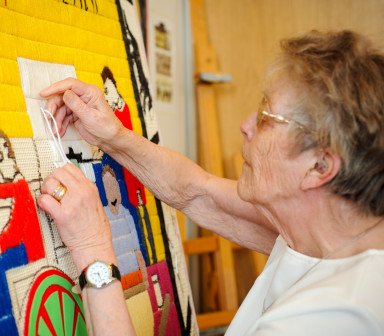As a relative, carer or friend, how do you help your loved one cope with losing their sight?
Visual impairment can result in practical, emotional and financial worries and changes for those diagnosed, and for their family and friends. Everyone is different, and the level of help they will want or need varies a lot.
Our team have put together suggestions for some of the most common worries you might be facing, with 6 key areas to start with. If you are looking for more advice and support in helping a loved one with sight loss, our Family Wellbeing Service can help.
Be there to listen and don’t be afraid to talk
If a friend or loved one with sight loss wants to talk to you about the problems they are experiencing, take the time to listen to them. Letting them know you are there as a listening ear and that they are not alone is an important first step. The experience of sight loss has been likened to the grieving process, and people will experience a range of emotions. This can be nerve wracking, and if you’re looking for a way to approach the topic, you can have a chat with our team who can help with finding a way to start the conversation.
Reach out to professionals and support networks
As much as you will want to help in any way you can, every person has their own experience of sight loss and there may be circumstances in which an expert is well placed to provide the advice and support your loved one needs.
It can be overwhelming to know who is the right person to speak to though.
For any medical advice relating to their sight, it is always best to encourage your friend or loved one to initially contact their GP or local optician and they may then be referred on to a hospital eye department. Specialist rehabilitation officers can provide expert advice and training to maximise safety, independence and quality of life.
If you're not sure where to start, give our Support Line a call for more advice.

Be mindful of your own wellbeing
The life-changing impact of experiencing sight loss naturally impacts a person’s relatives and friends, too. It’s important to remember that it is normal and completely understandable if you also find yourself struggling. If you are caring for someone who has sight loss, it is important to be able to take some time for yourself.
Keep mindful of how you’re feeling as you support your loved one and know that it’s okay for you to reach out for help and support is available. Providing support for someone else is very demanding. You might be doing this alongside other responsibilities and commitments. You might feel ill-equipped or unsure of what to do, but you don't need to cope alone. Our team are here for you too.
Learn about your loved one’s sight condition
You may not know exactly what it is like to live with a visual impairment yourself, but making efforts to learn all you can about what your loved one is experiencing shows them your willingness to support them and puts you in a better position to help. Learning about it together with your loved one means you’re overcoming the challenges as a team. There are many useful leaflets and online resources you could visit, such as exploring our Information and Advice section.
Many people find it valuable to watch online videos on what people with certain eye conditions such as macular degeneration may see. Your local sensory impairment team or rehabilitation officer may have simulation glasses they can let you try out, and these are a way of experiencing a little taste of what difficulties may be experienced by visually impaired people.
Encourage your loved one to maintain their independence
Understandably, a very common concern for many people experiencing sight loss is the thought of losing their independence. But it needn’t be this way, and there are many different solutions to help maintain independence. It's all about finding the right one for each person.
A rehabilitation officer can assess for specialist equipment and provide support such as long cane and route training, which can really help a person with a visual impairment to maintain their independence and regain confidence. The prospect of using equipment can feel daunting at first, but the impact of equipment and training can be life-changing, so encourage and support your loved one to consider it where they can.
Some well-intending relatives and friends may think they are being helpful when in fact they are doing things that are reducing a person’s independence. Rehabilitation officers can also work closely with you and the whole family unit, as well as your loved one, to give you the knowledge, training and confidence to support them to adapt to life with sight loss and regain and maintain their independence.
Help make simple changes at home
Small changes and adaptations at home can really help your loved one practically. Remove clutter from the house and remove things like loose rugs that could be potential trip hazards. Maintain consistency in where items are kept too – this really helps someone with sight loss to find things more easily. Your loved one will have items placed where they know they can reach them easily, so don’t be tempted to ‘tidy up’ for them, as they will have items in certain spots.
Help to make sure there is good lighting, as this can make a huge difference to everyday life. These are simple tips but can be really effective in helping your friend or relative maintain their independence. Some visually impaired people may find specific pieces of equipment helpful, such as these Liquid Level Indicators. Some may need additional adaptations to the home.

Get in touch
We offer free, confidential advice and support over the phone for families and carers of people with sight loss in Scotland. Call us or get in contact via our Support Line page.

